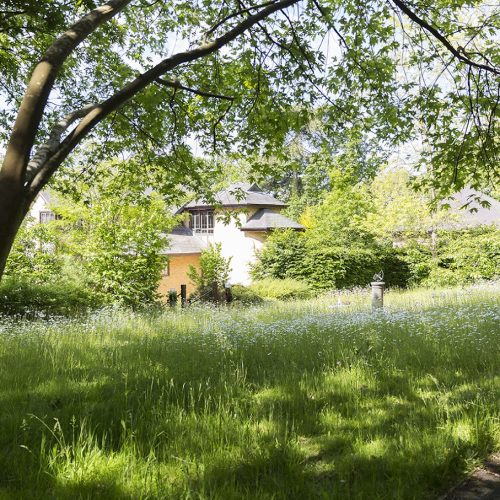How Kingsman House’s Award-Winning Gardens Support Dementia Care

Have you ever watched a loved one living with dementia suddenly brighten at the scent of lavender or the sight of familiar roses? These precious moments of connection remind us how powerful our senses can be in reaching through the fog of memory loss.
At Kingsman House, we’ve witnessed this transformation countless times in our award-winning care home gardens, where nature becomes a gentle companion in the dementia care journey. Outdoor spaces offer far more than fresh air and sunshine; they provide vital stimulation, comfort, and a bridge to cherished memories.
With over 20 years of experience in dementia care, we’ve designed our sensory gardens at Kingsman House to nurture wellbeing, spark joy, and create meaningful moments for residents and their families. Today, we’re exploring how these therapeutic spaces make such a profound difference.
What is a Sensory Garden?
A sensory garden is a carefully designed outdoor space that engages all five senses through thoughtfully chosen plants, textures, sounds, and interactive features. Think fragrant herbs like rosemary and mint, soft lamb’s ear leaves to touch, wind chimes creating gentle melodies, and vibrant flowers that attract butterflies and birds.
These dementia-friendly outdoor spaces are far from ordinary gardens; every element serves a therapeutic purpose. For people living with dementia, the sensory gardens at Kingsman House provide familiar sensory experiences that can unlock memories, reduce confusion, and create a sense of calm.
The combination of natural scents, tactile surfaces, and visual interest works together to stimulate cognitive function while offering a peaceful sanctuary away from the bustle of indoor life.

The Benefits of Sensory Gardens for Dementia Care
The benefits of sensory gardens for dementia extend far beyond simple enjoyment, touching every aspect of physical, emotional, and social wellbeing for residents.
Memory Stimulation
Familiar scents hold remarkable power to transport us through time, and for someone with dementia, this can mean reconnecting with treasured memories. The perfume of old-fashioned roses might remind your loved one of their wedding day, while the earthy smell of tomato plants could bring back summers spent gardening with family.
At Kingsman House, we’ve carefully selected plants that evoke these nostalgic connections. Patrick, our expert gardener, tends herbs like sage and thyme that release their fragrance when touched, creating spontaneous moments of recognition and joy. Research shows that sensory stimulation can improve cognitive function and quality of life for dementia patients.
Reduced Anxiety and Agitation
Natural surroundings have a scientifically proven calming effect on the nervous system, and this is especially valuable for people experiencing the confusion and distress that dementia can bring.
The gentle rustling of leaves, the soft chirping of birds, and the warmth of sunshine work together to soothe agitation and ease anxiety. Our dementia-friendly outdoor spaces at Kingsman House provide a peaceful retreat where residents can escape feelings of overstimulation or restlessness.
The rhythmic patterns found in nature, such as swaying branches or rippling water features, create a meditative atmosphere that helps regulate emotions. We’ve seen residents who were pacing indoors settle peacefully on a garden bench, their tension visibly melting away.
Encouraging Physical Activity
Staying mobile is crucial for maintaining independence and overall health, yet getting people with dementia to exercise can be challenging. This is where therapeutic gardens for elderly residents truly shine. Our award-winning care home gardens feature safe, accessible pathways that invite gentle exploration without the intimidation of structured exercise programmes.
The smooth, even surfaces accommodate walking frames and wheelchairs, while handrails provide reassurance for those unsteady on their feet. Patrick has designed meandering routes that naturally encourage movement, with interesting features placed at intervals to motivate residents to keep walking.
Whether it’s checking on the bird feeders, deadheading flowers, or simply strolling to a favourite bench, residents engage in physical activity that feels purposeful rather than prescribed. This gentle movement supports mobility, circulation, and muscle strength while residents simply enjoy being outdoors.
Promoting Social Interaction
Isolation can be one of the most heartbreaking aspects of dementia, but our sensory gardens at Kingsman House create natural opportunities for connection. The garden becomes a shared destination where residents, family members, and care staff gather in a relaxed, informal setting.
Unlike the more structured environment indoors, the garden encourages spontaneous conversations about the flowers, shared memories of gardening, or simple observations about the weather. We’ve watched friendships blossom over admiring Patrick’s latest planting scheme or working together to water the herbs.
For families visiting loved ones, the garden provides a peaceful backdrop for quality time that feels less institutional and more like an afternoon at home. These outdoor activities for dementia patients aren’t just about keeping busy; they’re about maintaining the social bonds that give life meaning and preventing the loneliness that can deepen confusion.
Enhancing Mood and Wellbeing
Sunlight is nature’s antidepressant, triggering the production of serotonin and helping regulate sleep patterns that are often disrupted in dementia. Fresh air improves oxygen flow to the brain, while the sensory engagement of being outdoors stimulates mental alertness.
The combination creates a powerful boost to dementia care wellbeing that no indoor environment can replicate. At Kingsman House, we’ve witnessed residents who seemed withdrawn indoors become animated and engaged in the garden. The simple act of feeling warm sunshine, hearing birdsong, and breathing in the scent of flowers can lift spirits remarkably.
Patrick takes pride in ensuring there’s always something blooming, providing year-round colour and interest that brightens even difficult days.
Kingsman House's Award-Winning Gardens
We’re immensely proud that our sensory gardens at Kingsman House have won six awards. In 2025, we’ll be entering our gardens into the Bournemouth in Bloom competition; this marks our first time entering. To ensure you make a statement in our first year, Patrick has poured his heart into creating spaces that combine beauty with therapeutic purpose.
Here’s what makes our gardens special:
- Fragrant plant selections including lavender, roses, and aromatic herbs that stimulate memory and provide sensory interest
- Tactile surfaces such as smooth pebbles, soft grasses, and varied textures that invite touch and exploration
- Bird-friendly features with feeders and native plants that attract wildlife, creating a living, dynamic environment
- Safe, accessible pathways with even surfaces, gentle gradients, and supportive handrails throughout
- Thoughtfully placed seating offering sunny and shaded spots for rest, reflection, and social gatherings
- Seasonal planting schemes ensuring year-round colour, interest, and sensory engagement
These dementia-friendly outdoor spaces reflect our deep commitment to creating environments where residents don’t just live but truly thrive.

Experience the Difference at Kingsman House
Incorporating sensory gardens in dementia care isn’t just theory; it’s something we witness every day at Kingsman House. From memory-sparking scents to peaceful moments of connection, our award-winning gardens are an essential part of the personalised, compassionate care we provide.
With over 20 years of experience and fully trained staff dedicated to your loved one’s wellbeing, we understand what makes a care home feel like home. We’d love to welcome you for a visit so you can experience our beautiful gardens and meet our caring team.
Call us on 01202 037373 or complete our contact form to arrange a personal tour. We’re always here to help guide you through the next steps.














